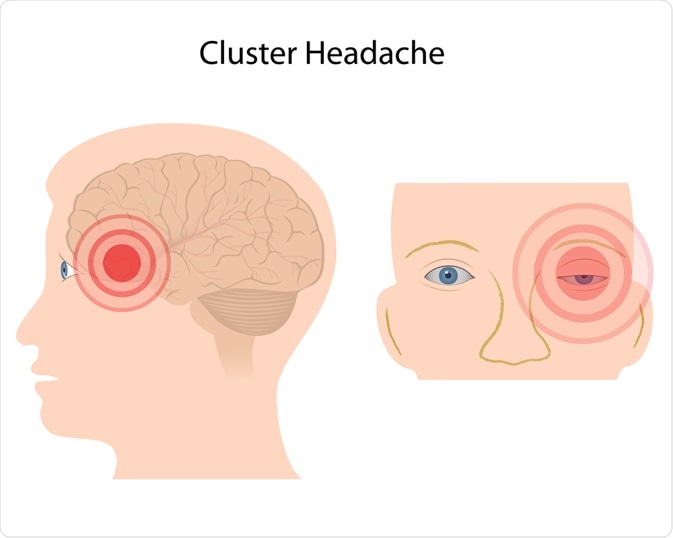A cluster headache, which is also known as histamine headache, is a rare but painful type of headache that affects approximately 1 to 2 people per 1,000 population. It involves several attacks of intense unilateral pain that last for a short period of time.
As the pain reaches a peak very quickly, simple analgesics are not usually able to provide effective relief and fast-acting alternatives are preferred. Preventative treatment to reduce the frequency of attacks also plays an important role to improve patient quality of life.

Image Credit: Alila Medical Media / Shutterstock.com
Causes
The precise cause of cluster headaches is not well understood, although there may be a link to the hypothalamus in the brain. There may be a genetic link associated with cluster headaches, as 1 in 20 people with the condition reports a family member who also suffers from cluster headache.
Cluster headaches may present in individuals of any age but are most likely to begin in early adulthood. Affected individuals usually suffer from cluster headaches throughout their lifetime, although the remittance periods typically extend in length with age.
Triggers for cluster headache include:
- Alcohol consumption
- Excessive smoking
- Inhalation of fumes (e.g. petrol, paint, perfume, bleach, solvents)
- Exercise
- Extreme heat
Symptoms
The pain associated with a cluster headache is always unilateral and usually centered over one eye, temple, or forehead, although the affected side can alternate for some patients.
The headache pain usually presents suddenly and at a particular time each day and reaches a peak in intensity 5-10 minutes later, which may continue for up to a few hours before it stops spontaneously.
Many patients experience a bout of cluster headaches that occur regularly for a few weeks, which then resolves for a period of time, known as episodic cluster headache. A small proportion of patients (approximately 20%) experiences chronic cluster headaches with no symptom-free period between attacks.
Other symptoms of cluster headaches may include:
- Blocked or runny nose
- Drooping eyelid on the affected side of the face
- Redness of eye on the affected side of the face
- Flushing
- Sweating
Diagnosis
The diagnosis of cluster headaches involves a thorough medical history with particular attention to the symptoms of the headache. There is no specific test used to diagnose the condition; however, imaging techniques such as magnetic resonance imaging (MRI) scans can help in the differential diagnosis of other conditions.
What Are Cluster Headaches?
Acute treatment
During an acute attack, the pain usually reaches a peak very quickly; therefore, timely treatment is critical to reduce pain. Simple analgesic medications do not usually provide sufficient relief from the intense pain associated with cluster headaches. Instead, administration of oxygen is a safe and effective treatment option often used in practice, which begins to show effects 15 minutes after administration.
Additionally, sumatriptan injections or nasal sprays may also help to provide effective pain relief during an attack. Administration via injection usually has a faster onset of action, which is critical in the relief of cluster headache pain.
Prevention
There is no cure for cluster headaches and patients who suffer from the condition may experience an attack at any time. However, there are a number of management techniques that can help to prevent attacks from occurring.
Firstly, avoidance of known triggers for cluster headaches, such as smoking, alcohol, and strong smells, is important.
There are also some pharmacological options that can be used to aid in the prevention of cluster headaches. These include:
- Verapamil
- Methysergide
- Lithium
- Corticosteroids
- Ergotamine
- Topiramate
Verapamil is the most commonly used option in practice and is often able to help in the prevention of cluster headaches, although the side effects of the medication should be considered. In particular, verapamil can change the rhythm of the heart and this should be monitored throughout preventative treatment.
References
Further Reading
Last Updated: Feb 24, 2023